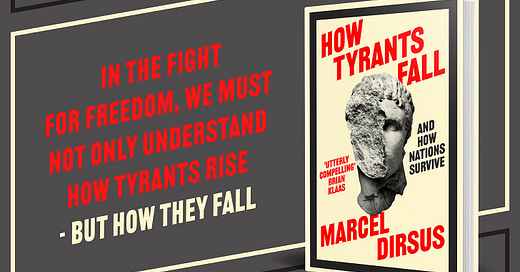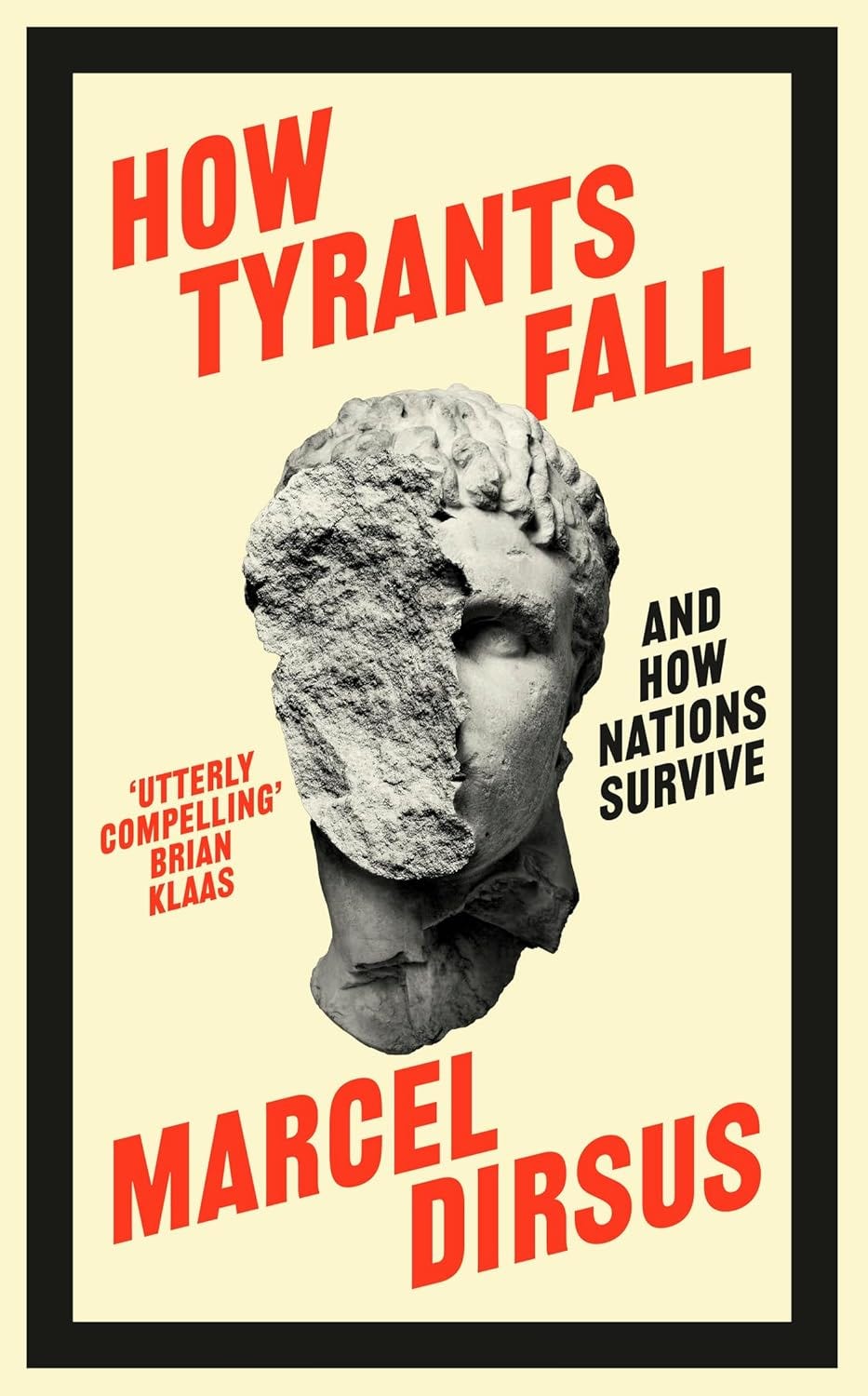My new book, How Tyrants Fall: And How Nations Survive is out in the United States and Canada today! If you’re interested, you can pick up a copy from your local bookstore or the usual suspects online. If you prefer ebooks or audiobooks, those are available too.
Since a lot of people have asked me what it’s like to write a book, I thought I’d use this occasion to share a few thoughts. If you have any questions, feel free to comment.
More than anything else, the process is quite odd. As Brian Klaas explained in The Garden of Forking Paths, most books intended for a general audience begin life after an author has managed to find an agent:
You first need to convince an agent that you’re worth the investment of their time. They’re going to try to get you a deal, but they don’t make any money unless you make money, so they have an incentive to only represent an author if they’re pretty sure the work will sell. Moreover, if agents keep pitching bad ideas to publishers, the publishers will start ignoring that agent’s pitches, so there’s a strong incentive for agents to be selective.
This process may sound straightforward, but it can take months or even years. Many authors never find an agent. It’s difficult! And when it’s done, you still don’t have a book deal because:
For nonfiction, books are sold on proposals, which often include an overview, a sample chapter, a detailed chapter outline, and a proposal that indicates why the book might have an audience. If you’re Yuval Noah Harari—the author who wrote the runaway bestseller Sapiens—well, you’re now going to get a book deal no matter what. But if you’re less well-known, or you’re writing about a topic that’s more obscure, or you’re unlucky, it can be an uphill battle.
Publishers want to make money, so they see a first book from an unknown author as a risk. And to be fair to them, that makes sense. When people wander into bookshops, they tend to be drawn towards authors they already know, and that makes it more likely that at least some books will be sold.
So how did I get a book deal from a major publisher? I was incredibly lucky. After working on dictatorships for many years, I got an email from an editor asking me whether I might be interested in writing How Tyrants Fall. Yes! We had a call, I drafted a proposal and the deal went through. And all of it without even having a literary agent. In fact, I still don’t have an agent.
After the deal was signed, I spent more than a year reading and interviewing. You write and re-write. After months and months of poring over the manuscript, you send a draft to the editor and then you re-write again. And again. And again. It’s frustrating, of course, but also incredible. Here you are, getting paid to think about a topic that you’re so passionate about. What else could one possibly want?
When the book comes out, what the author is expected to do shifts drastically. Instead of reading academic papers day in and day out, days are now dominated by print interviews, opinion articles or podcasts. If you’re curious, the latest podcast I’ve done is below.
Book release is a reason to celebrate, but it’s also somewhat terrifying. Will anyone actually want to read the book? What if nobody cares? What if critics hate it? It’s difficult to avoid asking yourself those types of questions. Once again, I have been very lucky. The book received positive reviews in The Guardian, The Financial Times, The Telegraph and the Times Literary Supplement. The Economist recommends it as one of the best books of the year. I was happy about all of these, but my favourite feedback so far was from a reader who told me that the book made her view the news differently. What a compliment!
One of the most interesting aspects of all this is how the book is perceived elsewhere. When foreign publishers buy the translation rights to the book, they get the option of adapting its presentation for the local market. As a result, some editions look drastically different. This is what the original book looks like:
In comparison, the Portuguese and Italian editions are below. As you can tell, the former is reasonably similar while the latter looks completely different.
Since I don’t speak Portuguese, Italian or any of the other languages into which the book is being translated1, almost all translations happen without my involvement—the one exception is German. I originally thought the German publisher might want me to translate the entire book, but they didn’t. In hindsight, their argument against it was a good one: If the author himself translates the book, he wouldn’t actually translate but re-write it. For me personally, I think that’s probably true. As you translate the text, you inevitably find things that could be done differently. But also, German is my native language and the language in which a lot of friends and relatives will read the book, so the temptation to try to make it “perfect” is even greater although it’s obviously impossible to do. In the end, going through the translated text was challenging enough but it’s done: Wie Diktatoren Stürzen will be out in February. Finally!
If you haven’t already, I’d be honoured if you checked out How Tyrants Fall. Working on the book has given me a much more positive outlook on the world. Things may seem bleak and in many ways they clearly are, but there genuinely is hope and when it comes to tyrants, things really can get better. Thanks for reading and thank you for your support!
-Marcel
In addition to the original English, How Tyrants Fall is set to be translated into Czech, Polish, Ukrainian, Portuguese (Portugal), Japanese, Korean, Lithuanian, Slovak, Romanian, Hebrew, Portuguese (Brazil) and German. The Italian edition has already been published. With some luck, there might be even more interest in translations in the future.








Congratulations. I hope to get around to reading it at some point. However my book backlog is a bit of out of control!
Congrats on your amazing success with your very first book! When I was finishing my dissertation, someone said to me, “It's hell to write, but heaven to have written.” No joke, I rewrote my dissertation 14 times in the editing process.
On the subject of tyrants, I am keenly aware that some people think Trump 2025 will equal Hitler 1933. I agree that there are strong points of similarity between the men's verbal talents and their level of hostility, but I think Hitler was capable of a very savvy and determined pursuit of clear goals. Trump's mind can barely stay on the same topic for two minutes. Here's the full post:
Will Trump 2025 = Hitler 1933?
https://kathleenweber.substack.com/p/will-trump-2025-hitler-1933